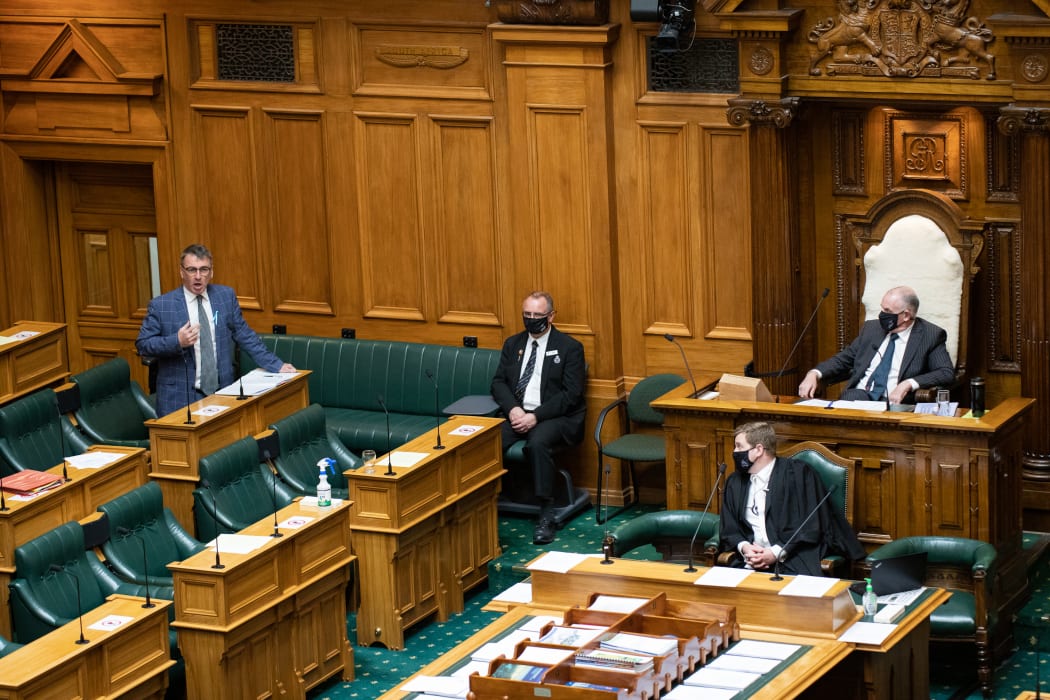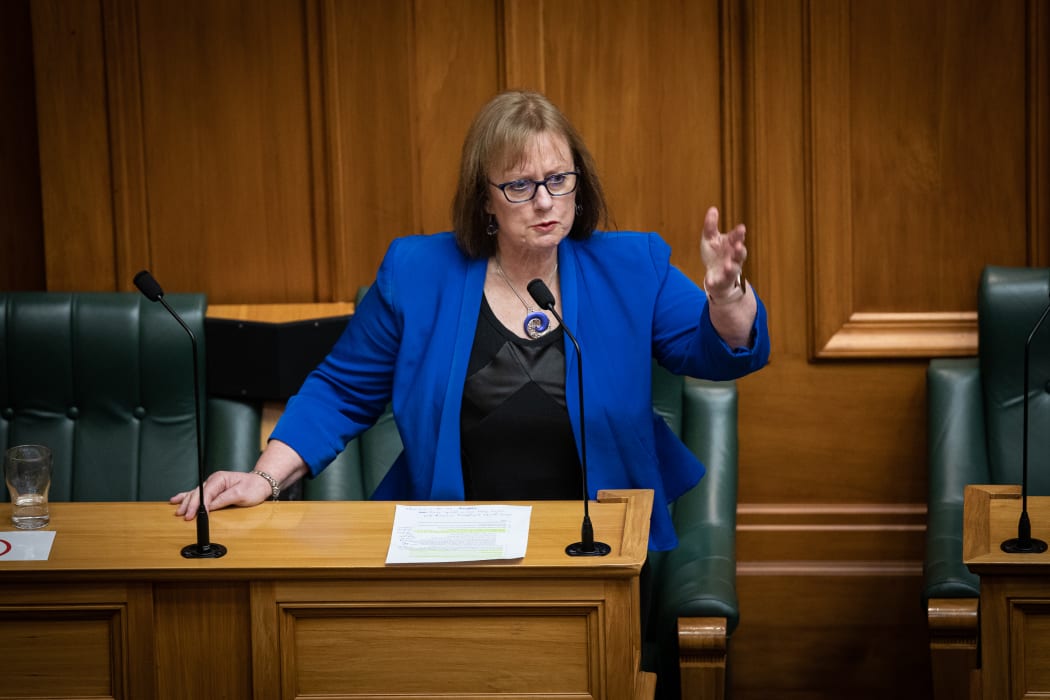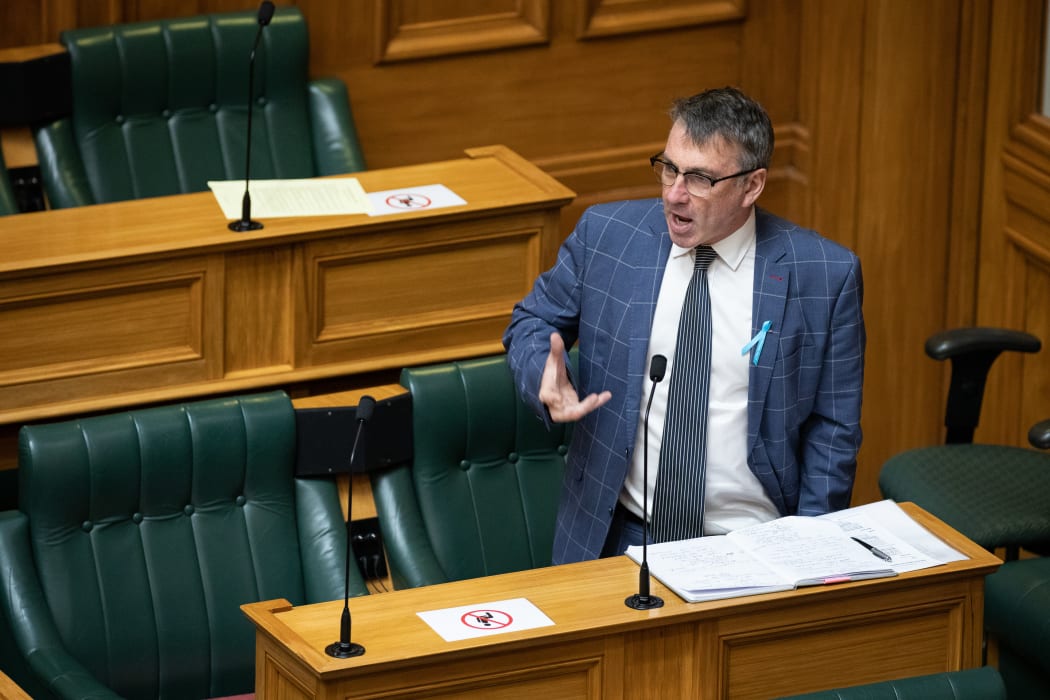Higher alert levels never stopped Parliament’s select committees from working remotely, including hearing hundreds of submissions on legislation online. Committees are still working remotely.
The debating chamber however was meeting face to face with tiny numbers of MPs, and so did just two things: allow the Parliament to keep a check on the Government and debate any necessary Covid rules.
The House didn’t debate any non-Covid law for more than a month, so this week (with many MPs back on precinct) has been a return to full-throttle House work.

Duncan Webb in the House watched by the masked Speaker and Clerk at the Table Photo: VNP / Phil Smith
Wednesday was a member’s day (the first for seven weeks) when non-government bills are debated, but Tuesday was a government day and they took full advantage.
In six hours the House moved four different bills through a debating stage and got half way through a fifth.
The bill that got the most media attention was the Counter-Terrorism Legislation Bill, which achieved a second reading after having been in committee for a few months. It had the unusual symmetry of support from Labour and National and opposition from Green, ACT and Te Pāti Māori.
Drinking water regulation
There were also two other second readings - when a bill returns to the House from select committee after public consultation, and the House votes whether or not to accept the committees’ suggested amendments.
The Water Services Bill is part of Local Government Minister Nanaia Mahuta’s planned overhaul of the national water infrastructure. This bill deals with drinking water. It had returned from select committee after nearly a thousand submissions. This bill has a more traditional support/opposition split.
“We should be confident that drinking-water standards, which reflect the standards set by the World Health Organization, are being met by our drinking-water suppliers, particularly those which are publicly owned and operated. In many areas, sadly, this is not the case.” - Nanaia Mahuta (Labour)
“Yes, we want clean water. Yes, we support Taumata Arowai, but, actually, we're becoming a nation of rather than the number eight wired country that we used to be—we're becoming a nation that is strangling people in red tape.” - Barbara Kuriger (National)

National MP Barbara Kuriger in the House this week Photo: VNP / Phil Smith
Sole parent work requirements
The third bill getting a second reading was one that undoes a change an earlier National Government had made to benefit rules around sole parents. The Social Security (Subsequent Child Policy Removal) Amendment Bill moves work requirements for those who give birth while on the sole parent benefit from when their youngest child is one to when the youngest turns three.
Labour, Green and Te Pāti Māori are in support of the Bill, National and ACT oppose it.
“Working parents get 12 months' leave and have to go back to work, but Government want to pay beneficiaries three years looking for work. This seems to me unfair. ...There should always be a safety net, but welfare dependency should never become a lifestyle choice.” - Toni Severin (ACT)
“So to suggest that to reduce child poverty we deprive children of support absolutely defies logic.This bill is getting rid of a punishment for having children—an effective financial sterilisation of a woman…” - Duncan Webb (Labour)

Labour MP Duncan Webb in the House this week Photo: VNP / Phil Smith
Three levers to move NZ into cleaner cars
The final bill discussed was a brand new bill getting a first reading - which means that the public will soon be asked to make submissions on it. The Land Transport (Clean Vehicles) Amendment Bill, from Minister of Transport Michael Wood aims at reducing climate effecting emissions from the nation’s light vehicle fleet using three separate levers.
It would apply a clean vehicle standard to imports, formalise a system of clean vehicle subsidies/dirty vehicle charges, and create a vehicle labeling requirement to inform buyers of vehicle emissions.
Again the support/opposition split is Labour-Green-Māori / National-ACT.
“The transport sector currently produces 43 percent of New Zealand's carbon dioxide emissions and 20 percent of all greenhouse gas emissions. To achieve major emissions reductions, we must clean up the light vehicle fleet in New Zealand, which is currently one of the most polluting and least efficient light vehicle fleets in the OECD.” - James Shaw (Green)
The opposition focused primarily on the subsidies/charges lever.
“This is a tax. This is a redistribution of funding from middle and lower income New Zealand to wealthier New Zealand. This is those who can't afford an $80,000 electric vehicle (EV), and it's taking money from them to assist the wealthy to buy their expensive EV.” - Penny Simmons (National)
The bill they didn’t quite get through on Tuesday, but will pick up debate again on Thursday is the yearly one that sets the tax rates for the current year.
Making up for lost time
With three weeks of debating time lost recently the remaining sitting weeks this year will see some changes.
The Government will likely prioritise what gets debated, focusing on bills with deadlines (like the tax rates), on core agenda items and on business it wants select committees to be able to consider over summer (so it can return to be completed early next year).
And to claw back some of its lost hours Parliament is going to be sitting six extra mornings over the next three sitting weeks to catch up on some lost time.


